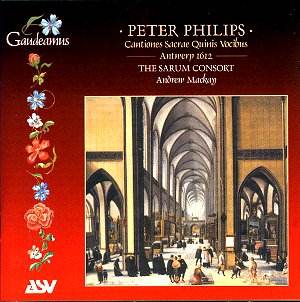I remember, as a choirboy that Ascensiontide would come round and out would come 'the Philips' - Ascendit Deus, almost the only piece by this incredibly prolific composer which seemed to be in a cathedral choirs' repertoire. I think that we did 'Gaudent in Caelis' once but nothing else. Sadly the same situation seems to apply thirty years on. I would like to think that this CD would help to promote the composer more. There have occasionally been other recordings partly or wholly dedicated to this composer but there has been no change. The Cathedral repertoire remains staunchly predictable.
Peter Philips was born in England but the cover picture, one
of those delightful Dutch church interiors tells another story, that
of a composer in exile on the continent for his Roman Catholic practices
and beliefs. He was born in London and was probably a choirboy at old
St. Paul's, but he left London in c.1578 going to the English community
at Douai and then on to Rome. He worked for a time in the service of
the exiled Catholic nobleman Lord Thomas Paget and he must have gone
on to Spain with him and later to France and then the Netherlands. He
made a setting of Cavalieri's famous ballo tune from the Florentine
Intermedii of 1589 whilst in Italy. After Paget's death Philips settled
in Antwerp where he taught and composed. Throughout this period he must
have been momentously busy.
In 1622 Henry Peacham wrote in 'The complete gentleman' " Nor must I forget our rare countryman Peter Philips, organist to their 'altezzas' at Brussels and now the greatest master of music in Europe. He hath sent us over many excellent songs, as well as motets as madrigals. He affecteth altogether the Italian style"
There were 69 motets in five parts published in 1612 and in 1613, 30 eight-part motets. He composed motets 'en duo' and 'en trio' in Gemmulare Sacrae of 1616. In 1628 he published a last collection of no less than 106 motets for one, two and three voices with basso continuo. There are also keyboard works found in 'The Fitzwilliam Virginal Book' and instrumental dances which lay around in manuscript.
Effectively no northern composer could rival him in quantity or quality. It was only for the keyboard music that he was 'The English composer'; one can rather consider him as 'Roman' in connection with the motets and madrigals, his only collection being published in 1596. A skilful polyphonist, he knew his métier without losing himself in polyphonic acrobatics, extravagant chromaticism, or exaggerated word painting.
The 'Cantiomnes Sacrae Quinis Vocibus' published in Antwerp, was his first major publication. It is dedicated to the Virgin Mary. Andrew Mackay in his useful booklet notes writes that " This seriousness of intent is underlined by Philips' choice of texts, he shows a marked preference for setting words from liturgical sources such as antiphons and responds and hardly ever chooses freely fromů. the Psalms as earlier renaissance composers so often did".
Influence of other composers may be found. Andrew Mackay writes " O beatum sacrosanctum diem' is a Christmas Day motet showing distinct similarities to Sweelinck's 'Hodie Christus Natus Est' ", Philips surely knew Sweelinck who was also working in Antwerp at the time. To my ears the motet 'Stella Quam Viderunt Magi' sounds very Italian, Palestrina comes to mind.
I have to say that only having one to a part in some of these motets gives for this listener at least, too much of a domestic or chamber effect. I have become so used to the louder more public pieces being sung by a choir of say a dozen or more boys and several men that I feel that some of the majesty is lost. Normally choirs are expected to attack 'Ascendit Deus' with forthright gusto whereas the opening here is relaxed and almost limp. The Alleluia's dance in madrigalian triple time. Yet I am reminded that another Catholic, William Byrd, almost certainly heard his motets and certainly his masses performed in a small private chapel belonging to Lord Petre in Essex at this time. The more intimate motets like 'Ave Verum Corpus' certainly benefit from this chamber approach. Some motets seem to owe to debt to the madrigal, for example' Gaudeamus Omnis'. But surely Philips was writing for continental choirs very likely quite large ones, so you must first learn to listen to the grander motets like 'Hodie Sanctus Benedictus' and Ascendit Deus' with different ears. The other point which seasoned Anglican Evensong listeners will have to get used to is the hard 'c', so that pace becomes 'packe', and 'caelestis', 'kaelestis'. Although if you remember your school Latin and if you appreciated crisp consonants this will appeal to you as it generally does to me. Many of the pieces are accompanied by a little organ continuo. I am not quite sure how it was decided which, but the chose works well as in 'Cantabant Sancti'. Having overcome these points you may settle into the CD better than I have.
The singing is undoubtedly first class both collectively and individually, and the recording quality is excellent. The venue is ideal and should be considered again. The Sarum Consort is a very promising ensemble. I would ask them to consider a disc of English madrigals next - a repertoire which could suit them ideally.
Gary Higginson
The singing is undoubtedly first class both collectively and individually, and the recording quality is excellent. The venue is ideal and should be considered again.

![]() The Sarum Consort directed
by Andrew Mackay
The Sarum Consort directed
by Andrew Mackay ![]() ASV Gaudeamus GAU 217
[69.00]
ASV Gaudeamus GAU 217
[69.00]